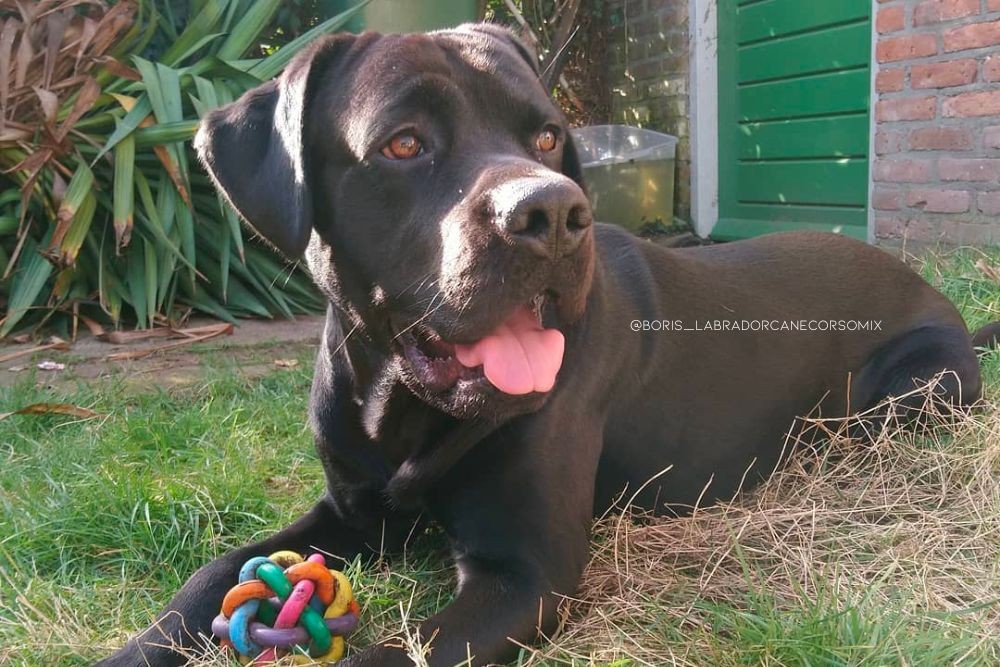
The Cane Corso Lab mix, also known as the Labrador Corso, represents a fascinating hybrid combining the Labrador Retriever's friendly temperament with the Cane Corso's protective instincts. This designer breed typically weighs between 85-110 pounds and inherits varying physical and behavioral traits from both parent breeds. While the mix benefits from the Lab's trainability and the Corso's guarding abilities, proper early training and socialization are essential. These powerful yet affectionate dogs require spacious living conditions, regular exercise, and committed owners who can manage their size and energy levels. Health-wise, they may face joint issues common to both parent breeds.
Physical Characteristics and Traits of the Labrador Corso
Size and Build
The Labrador Corso inherits a powerful, muscular build from both parent breeds. According to multiple sources, their appearance can vary significantly between litters - some puppies display the softer features of a Labrador while others inherit the more imposing Mastiff-like structure of the Cane Corso. Adult Labrador Corsos tend to be large dogs, with many reaching weights over 100 pounds, particularly those taking more after their Cane Corso parentage.
Personality and Guard Dog Capabilities
The Labrador Corso combines the natural guarding instincts of the Cane Corso with the friendliness of the Labrador Retriever. According to breed experts, while they can appear intimidating due to their size and muscular build, they are typically fun-loving and social dogs that form strong bonds with their families. Their territorial nature makes them effective guard dogs, but they are generally not aggressive without cause. The mix tends to be calm and patient indoors while maintaining high energy levels for outdoor activities. Their intelligence and quick learning abilities, inherited from both parent breeds, make them highly trainable when provided with proper early socialization and consistent training.
Physical Characteristics and Appearance of Cane Corso Lab Mix
Coat and Color Variations
While previous sections focused on size and build, the Labrador Corso's coat characteristics are equally distinctive. According to breed information, they typically have short, dense fur that requires minimal grooming. The coat can range from moderate to heavy shedding depending on which parent breed's genes are more dominant. Color variations commonly include black, chocolate, yellow (from the Lab side), as well as brindle, fawn, and gray (from the Corso heritage).
Temperament and Personality Traits of Cane Corso Lab Mix
Activity Level and Social Nature
Building upon earlier personality discussions that focused on guard dog capabilities, this section examines their exercise needs and social characteristics. According to breed experts, the Labrador Corso requires substantial daily physical activity - typically at least one hour per day. They excel in various activities including hiking and swimming, inherited from their water-loving Labrador parentage. These dogs demonstrate remarkable versatility in their exercise preferences, making them suitable companions for active families.
The mix exhibits an interesting duality in their social behavior - they're naturally protective yet sociable when properly trained. Research shows they maintain a balanced temperament, being calm and patient with family members while remaining alert to potential threats. Their intelligence makes them quick learners, though their strong-willed nature necessitates consistent training from an early age to ensure proper socialization and behavior management.
Health and Care Requirements of Cane Corso Lab Mix
Genetic Health Considerations
While previous sections covered physical traits and temperament, understanding potential health issues is crucial. According to health data, the Labrador Corso can inherit several genetic conditions from both parent breeds. They are particularly susceptible to joint problems like hip and elbow dysplasia, which require careful monitoring. These large dogs may also experience eyelid abnormalities and heart conditions. With proper care and regular veterinary checkups, they typically maintain good health, though their life expectancy ranges from 9-12 years due to their large size.
Nutrition and Exercise Management
Unlike previous discussions that focused broadly on activity levels, this section specifically addresses the nutritional and exercise balance needed for optimal health. According to breed experts, Labrador Corsos require a carefully managed diet high in protein to support their muscular build while preventing weight gain, as they can easily become overweight. Their exercise routine must be structured to provide adequate physical activity without overstraining their joints, particularly during their growth phase. A balanced combination of controlled exercise and appropriate nutrition helps prevent obesity-related health issues while maintaining their muscular physique. These dogs thrive on consistent feeding schedules and portion control, with adjustments made based on their age, size, and activity level.
Conclusion
The Labrador Corso represents a unique blend of two distinct breeds, combining the powerful build and guarding instincts of the Cane Corso with the friendly, sociable nature of the Labrador Retriever. These large, muscular dogs typically weigh over 100 pounds and feature a short, dense coat that comes in various colors inherited from both parent breeds. Their temperament strikes a balance between protective watchdog and affectionate family companion, though they require consistent training and early socialization to manage their strong-willed nature.
For potential owners, it's crucial to understand that this mix demands significant commitment in terms of exercise, training, and health management. They need at least an hour of daily physical activity while being mindful of joint health, as they are prone to conditions like hip and elbow dysplasia. With proper care, including a carefully managed high-protein diet and regular veterinary checkups, Labrador Corsos can be excellent companions for active families who can provide the space, exercise, and attention these intelligent and energetic dogs require. Their life expectancy of 9-12 years is typical for large breeds, and maintaining their health through proper nutrition and exercise is essential for their wellbeing.